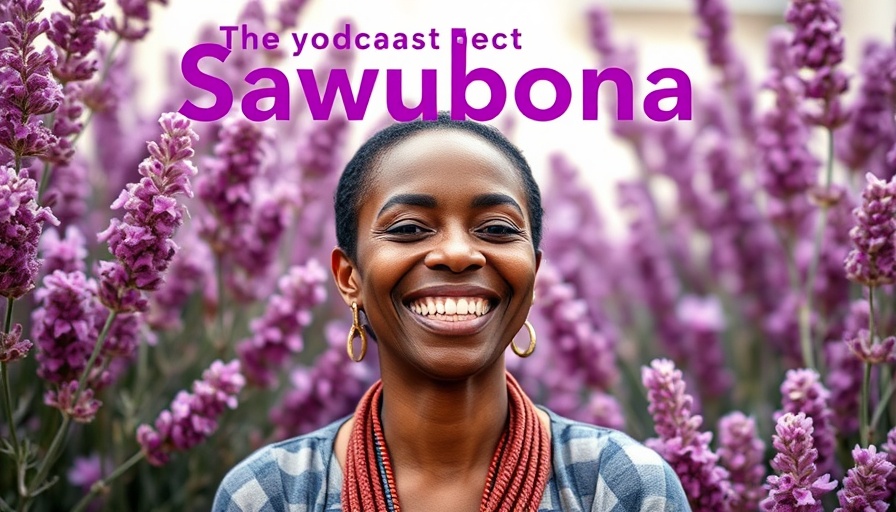
Understanding the Power of "Sawubona" in Mental Health
The greeting "Sawubona," which translates to "I see you," is more than a mere salutation; it encapsulates a profound understanding of human connection and the recognition of one another's validity in this intricate web of existence. In a world where loneliness is an increasing concern, particularly among vulnerable groups such as youth, the elderly, and those facing socio-economic challenges, "Sawubona" serves as an invitation to embrace full presence and meaningful engagement.
The Rise of Loneliness: A Silent Epidemic
According to mental health professionals, loneliness has become an epidemic, exacerbated by societal changes and, more recently, the COVID-19 pandemic. Reports indicate that millions feel isolated even when surrounded by others, underscoring a critical need for connection that goes beyond superficial interactions. These feelings are particularly significant for those suffering from anxiety disorders, depression, and various comorbid conditions. The act of acknowledging others with "Sawubona" can address these concerns by fostering a sense of belonging and community.
Bridging Cultural Context with Mindfulness
The phrase "Sawubona" encourages individuals to practice mindfulness, recognizing not just the individual but the entirety of their being, rooted in a collective cultural heritage. For many, this form of recognition can alleviate stress and anxiety, providing an alternative form of therapy that complements cognitive behavioral therapy (CBT) and other traditional mental health modalities. This holistic approach combines physical awareness with the emotional psychological support that is crucial in treating mental health issues, particularly in underserved communities.
A Mindful Meditation: Seeing and Being Seen
As we explore the deeper implications of "Sawubona," let’s engage in a meditation that encourages us to see and be seen. Begin by taking a deep breath. Visualize someone in your life whom you think might be struggling. This can be a friend, family member, or someone in your community. Picture them in your mind and greet them silently with "Sawubona." With this greeting, you acknowledge their existence and struggles, fostering compassion and empathy.
This simple act can create a ripple effect, prompting a change in how we interact with others, potentially alleviating workplace anxiety, social anxiety among students, and even helping to reduce the stigma around seeking help for mental health challenges. The intention behind "Sawubona" nurtures a supportive culture where individuals are encouraged to share their stories and seek assistance without fearing judgment.
Seeing Beyond: The Importance of Connection
The significance of being seen lies at the heart of emotional well-being; it assures individuals that they are valued members of the community. By embracing practices that promote visibility, such as greeting one another with "Sawubona," individuals participate in a collective healing process. This is particularly beneficial for populations facing significant mental health challenges, including anxiety disorders and depression, where the feeling of invisibility can amplify their struggles.
Future Predictions: Cultivating a Culture of Care and Understanding
As we navigate the complexities of mental health challenges in our increasingly disconnected society, cultural expressions like "Sawubona" will play an important role in shaping future mental health initiatives. These cultural touchpoints encourage the development of community-based programs focused on holistic mental health care, emphasizing emotional connection and understanding within diverse populations.
Actionable Insights: Moving Towards Mental Wellness Together
To promote mental health awareness, communities must prioritize initiatives that foster connection and understanding. Therapists and mental health advocates should work together, drawing upon culturally rich expressions such as "Sawubona" to design inclusive programs that reach individuals from various backgrounds. Incorporating mindfulness, counseling, and peer support group strategies can further enhance these efforts, creating safe spaces where individuals can share their mental health journeys without judgment.
Final Thoughts: Embracing Sawubona for a Brighter Tomorrow
The challenge of loneliness and disconnection is prevalent and cannot be ignored. By embracing the essence of "Sawubona," we afford each other the acknowledgment and respect needed to nurture genuine connections. As we look to the future, the act of seeing one another holds promise not only in alleviating individual mental health issues but also in forging resilient communities that thrive through understanding and support. Let us move forward with intention, inviting others to be seen and recognized in their uniqueness.
For anyone feeling the weight of anxiety disorders, depression, or any other mental health challenges, consider reaching out to resources like the SADAG helpline. Remember, you don’t have to face this alone—all it takes is a simple greeting of "Sawubona." Embrace the connections within your community and begin a journey toward collective healing.
 Add Row
Add Row  Add
Add 




 Add Row
Add Row  Add
Add
Write A Comment